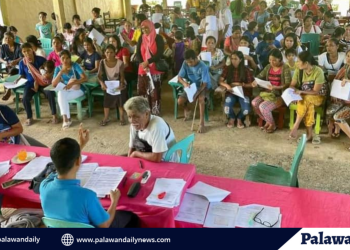The Provincial Veterinary Office (ProVet) of Palawan convened municipal agriculturists and veterinarians from various local government units on Monday, June 16, for its first semester consultative meeting, held at Ala Amid Bed and Breakfast in this city.
Led by Provincial Veterinarian Dr. Darius P. Mangcucang, the meeting aimed to review accomplishments for the first half of 2025 and align strategic plans for the upcoming second semester. The gathering served as a platform to strengthen the coordination between municipal and provincial agricultural offices and reinforce the province’s biosecurity and livestock protection measures.
Key discussions during the meeting included updates on ProVet’s flagship programs, such as the Rabies Eradication Program, Herd Health and Genetics Improvement Program, Disease Prevention and Disease Monitoring Program, and the Barangay Veterinary Aides Program. These initiatives are designed to improve animal health services in Palawan, particularly in far-flung and underserved areas.
Dr. Mangcucang emphasized the importance of continuous monitoring and close coordination among municipal agriculturists, veterinarians, and barangay biosecurity officers in ensuring early detection and response to emerging animal diseases. He also cited the significant role of the Barangay Veterinary Aides (BVAs) in extending basic veterinary care and community education on responsible animal ownership at the grassroots level.
One of the meeting’s highlights was the revisiting of existing provincial ordinances related to African Swine Fever (ASF), particularly protocols on preparedness, early detection, and rapid response. With ASF continuing to affect other regions in the country, ProVet underscored the importance of tightening biosecurity checkpoints and ensuring the strict enforcement of animal transport regulations across municipalities.
Aside from ASF, the office reiterated its focus on keeping the province free from other contagious livestock diseases such as Foot and Mouth Disease (FMD) and Avian Influenza (Bird Flu), which pose significant risks to both backyard and commercial livestock operations.
Surveillance and regular reporting activities in municipalities will continue in partnership with LGU-based veterinarians, agriculturists, and biosecurity officers, according to ProVet. The agency also expressed its intent to further capacitate local staff through technical training and access to updated disease prevention tools.
The meeting was held as part of the ongoing efforts of the provincial government to safeguard the health of Palawan’s livestock population, ensure food security, and support the livelihoods of local farmers and backyard animal raisers. ProVet reiterated its commitment to sustained inter-agency coordination and proactive veterinary governance across the province.























